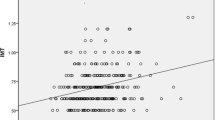Abstract
Objective
The study aimed to explore the relationship between the carotid intima-media thickness (IMT), lipids, high-sensitivity C-reactive protein (hs-CRP), homocysteine (Hcy) and other indices of laboratory and the traditional Chinese medicine (TCM) syndrome of dyslipidemia.
Methods
A total of 152 dyslipidemia patients and 8 healthy people (taken as the control group) were recruited. According to the theory of the TCM syndrome, 152 dyslipidemia patients were assigned to 4 groups: the stagnation of phlegm (SP) group, the blood stasis blocking channels (BSBC) group, the stagnation of phlegm and blood (SPB) group and the non-stagnation of phlegm and blood (NSPB) group. The carotid ultrasonic test, hs-CRP, Hcy, blood rheology and blood lipids were examined for all the recruited patients. The relationships among carotid IMT, laboratory indices and TCM syndrome of dyslipidemia were analyzed by the methods of F test and multiple linear regressions.
Results
(1) Carotid IMT was significantly different among groups of healthy people and different TCM syndromes. The sequence from lowest to highest was: healthy group, NSPB group, SP group, SPB group and BSBC group. (2) Triglyceride (TG) and blood rheology were significantly different between the groups of healthy people and different TCM syndromes. Among different TCM syndrome groups, TG and blood rheology in the NSPB group were the lowest, but were the highest in SPB group. (3) Hcy, very low density lipoprotein and TG were correlated with atherosclerosis of the carotid.
Conclusion
Carotid IMT, TG and blood rheology were closely correlated with the TCM syndrome of dyslipidemia. Atherosclerosis of the carotids would be prone to occur if one of these factors was heightened.
Similar content being viewed by others
References
Alan S, Ulgen MS, Ozturk O, Alan B, Ozdemir L, Toprak N. Relation between coronary artery disease, risk factors and intima-media thickness of carotid artery, arterial distensibility, and stiffness index. Angiology 2003;54:261–267.
McNeill AM, Rosamond WD, Girman CJ, Heiss G, Golden SH, Duncan BB, et al. Prevalence of coronary heart disease and carotid arterial thickening in patients with the metabolic syndrome (the ARIC Study). Am J Cardiol 2004;94:1249–1254.
Zhang YS, Dong XF, Liu FY, Zhang XZ, Wang X, Li WH. Relationship between carotid arteries ultrasound and coronary arteries disease with its risk factors. Chin J Clin Healthcare (Chin) 2007;10:51–53.
Fang Q, Wang ZL, Ning TH, Shao G, Chen ZJ, Lu ZL, et al. Suggestion of prevention and treatment of dyslipidemia. Chin J Cardiol (Chin) 1997;25:169–172.
Ministry of Health, P. R. China. Guiding principle of clinical research on new drugs of TCM. Beijing: China Medic-Pharmaceutical Sciences and Technology Publishing House; 2002:85.
Crouse JR, Harpold GH, Kahl FR, Toole JF, McKinney WM. Evaluation of a scoring system extracranial carotid atherosclerosis extent with B-mode ultrasound. Stroke 1986;17:270–275.
Zhou XW, Chen M, Li XM, Bai G, Zhou Q, Jiang SM. An approach to etiological factors and pathogenesis of dyslipidemia in TCM. Chin Arch Tradit Chin Med (Chin) 2007;25:197–198.
Qian XQ. Discussion on pathogenic factors and pathogenesis of hyperlipemia. Tianjin J Tradit Chin Med (Chin) 2002;19:50–52.
Yang L. Theory investigation of the TCM liver correlation and hyperlipemia. J Liaoning Coll Tradit Chin Med (Chin) 2005;7:322–323.
Author information
Authors and Affiliations
Corresponding author
Additional information
Supported by the National Natural Science Foundation of China (No. 90209001)
Rights and permissions
About this article
Cite this article
Lei, Y., Wang, Zh., Zhao, H. et al. Study of the relationship between carotid intima-media thickness and traditional Chinese medicine syndrome of dyslipidemia. Chin. J. Integr. Med. 15, 112–116 (2009). https://doi.org/10.1007/s11655-009-0112-1
Received:
Published:
Issue Date:
DOI: https://doi.org/10.1007/s11655-009-0112-1




